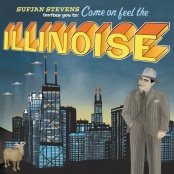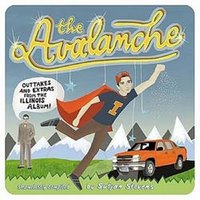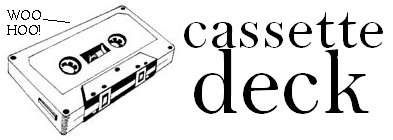In Defense of Sufjan Stevens

Recently, I've picked up on a couple of criticisms of Sufjan Stevens floating around in the ether, one a particularly hard-line case posted on Allmusic, and the other more of a comment-in-passing from Goodhodgkins. (Great essay!)
While I admit that Sufjan's persona is swaddled in pretension despite his "humble" demeanor, and his acclaim is perhaps overblown in the indie sphere, I find myself still very capable of enjoying his music. I'm no acolyte sending him fanletters every day expecting a sharpie-signed glossy headshot to hang above my bed, but his songs have a safe place nestled on my CD rack where they aren't collecting dust.
A point that Stephen Thomas Erlewine made in his article: his songs are professedly written as artifices devoid of an actual life experience to back it up.
Since when has degree of fiction versus non-fiction become the standard by which a good song is judged? Erlewine also states that Sufjan's music only serves to further compartmentalize indie music into its respective, tight niches. I have to say that it's not unusual for indie music to produce that effect, unless it's another "sounds like Death Cab meets The Strokes!" doppleganger.

It seems to be the case that when something as widely pawned off as "brilliant" by most respected publications and critics, award-givers, and mp3 bloggers, an album can be accused of closing off its own little indie corridor. While Sufjan's music isn't going to delight every listener, I don't think Sufjan's music intends to rope itself off. It's just the way his style of songwriting can be perceived after it becomes the talk of the town. They're just well-written collections of songs that's now being pandered to the average Amazon.com music customer after reaching such dizzying notoriety.
"A cold and calculated research project" is how Ryan at Goodhodgkins referred to Illinois (also drawn attention to in a recent Pitchfork review of The Avalanche.)
And well-researched, indeed--I actually envision Mr. Stevens hunched over a Mapsco (and I mean this in a non-facetious way), circling the names of towns that he deems fascinating enough to smatter across his sprawling song titles. Then, he looks them up on Wikipedia--or perhaps an actual hard-copy encyclopedia--depending mostly on if anybody is watching his efforts.
Cold and calculated as that may seem, I really don't find it a turnoff--and that's perhaps just where good old matter-of-opinion trumps reason. Hailing from the great state of Illinois myself, I spent a great deal of my childhood there, and simply the idea of a CD professedly "about" Illinois gives me warm fuzzies (some people call them "feelings.")
Yes, Sufjan names a song "Casimir Pulaski Day" to fit in with the whole Illinois concept, perhaps not caring a bit for Pulaski at all--but what I think of when I hear it? The first Monday of March each year--school cancelled, a denim and light pink spring jacket, refusing that dandelions were weeds, singing made-up medleys from the top of the wooden swing set ... never mind the whole "cancer of the bone" thing Sufjan's crooning about. I didn't know anything about cancer. I've got my own memories, and I've somehow infused them with Mr. Stevens's music swimmingly. I've fooled myself, or Sufjan fooled me.
Thankfully I don't have any fond memories of John Wayne Gacy Jr., as that was a bit before my time.

So technically, each song may in fact be completely unrelated to the youthful experiences and splendor of the state that I witnessed firsthand. But the music purportedly written "about" Illinois blends with my penchant for the state, to form this separate realm where my childhood can still be accessed simply by listening, or visiting. Sufjan didn't grow up in Illinois; he's a good faker. I take delight in transposing each of his baroque-drenched melodies to my own love for the state. I am of the mind that a great deal of art (including music) depends much on what the audience brings to the art--personal experiences, sufferings, desires, wishes--I suppose this is one case where I'm a relativist. And in this way, most music can be extremely isolated and compartmentalized, telescoped down to the way we perceive works of art through our own respective filters.
Self-aggrandizing as The Avalanche may be, I make no bones about paying $12 for Sufjan's table scraps. I'd probably be buggered off if the table scraps were of sub-par quality, which I find them on the whole to be rather good (though not quite Illinois quality, obviously.) Most of this defense might not exist were it not for the fact that I am fascinated by "Dear Mr. Supercomputer" Stevens and his deft mastery of artifice. I can certainly see how some may not be so easily convinced by him, though, and I certainly respect that.

All of Sufjan's precariousness, his pretentious fifty-state scheme, the way he probably sifts through books on each of the states to gather song titles is a pretty little contrivance to make art imitate life. And with my own personal biases considered and penchant for his style of folky harmony-rich pop, I can easily convince my life and past experiences to imitate his art.


